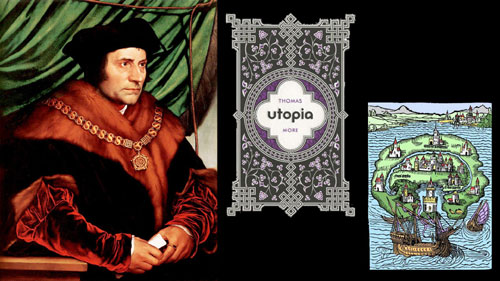|

In
the early 16th century, Sir Thomas More
described an imaginary island called Utopia,
whose inhabitants lived in a much more
sustainable and egalitarian society than
those which existed in Europe at the time.
Significantly, in Utopia, life is communal
with no private ownership; everything
is shared - goods are stored in warehouses
and people are given things when they
need them. Meals are eaten together as
a community, with families rotating dining
responsibilities. Everyone has free access
to hospitals and other community institutions,
and religious tolerance is the way of
the land, with each respecting another's
beliefs. However, in Utopia personal freedoms
are somewhat limited. Although the laws
are simple so that they are understood
by everyone, they create a society of
conformity, with mandatory employment
in specific trades, simplicity of dress,
restricted ability to travel, and general
lack of privacy. Unlike European women,
Utopian women enjoy equal rights with
men, but their prescribed roles tended
to be more household-oriented. Curiously,
slavery is accepted in Utopian society
(as it was in Europe), and is the punishment
for such crimes as traveling without a
passport and adultery.
Thomas
More's intentions in writing Utopia
are debated, but it is generally thought
that he meant the book to be more of a
criticism of life in his native England
than a promotion of the way of life described
on his fictional island. The book is filled
with inside jokes and satirical depictions;
even the name of the fictional island
he described is layered in double-meanings
- the roots of 'Utopia' can be translated
as either 'no place' or 'good place'.
Regardless of his motivations, and although
he wasn't the first to describe a utopian
society, Thomas More's vision inspired
centuries of Utopian literature,
and his work presented concepts in political,
religious and social thought that greatly
influenced future theorists, philosophers
and political organizers. Socialism and
communism, for example, were greatly influenced
by More's utopian depiction.
|